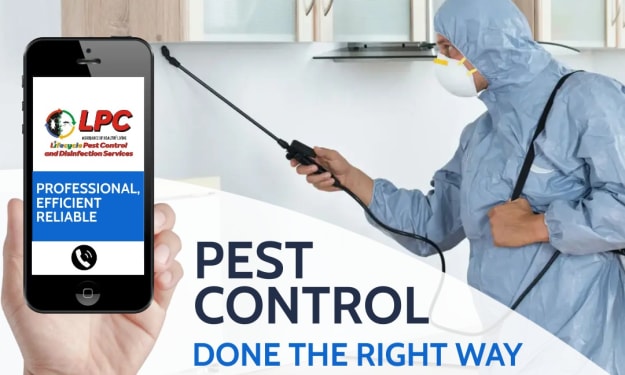The Ethics of Pest Control: Balancing Human Needs and Animal Rights,
Understanding the Need for Pest Control

The Ethics of Pest Control: Balancing Human Needs and Animal Rights
Pest control has been a crucial aspect of human life for centuries, evolving from primitive methods to pest control in pune sophisticated technologies aimed at protecting crops, homes, and public health. However, the ethical implications of pest control are complex and multifaceted. This article delves into the ethical considerations https://lifecyclepestcontrol.in/ involved in pest control, exploring the delicate balance between human needs and animal rights.
Understanding the Need for Pest Control
Pests, defined as pest control in pune any organisms that adversely affect human activities, can cause significant harm. In agriculture, pests such as insects, rodents, and birds can devastate crops, leading to food shortages and economic losses. In urban settings, pest control in pune like rats, cockroaches, and termites can damage property, contaminate food, and spread diseases. Mosquitoes, for example, pest control in pune are vectors for deadly diseases like malaria, dengue fever, and Zika virus.
Given these threats, pest control in pune necessity for pest control is evident. Effective pest management ensures food security, protects public health, and preserves property. pest control in pune However, the methods employed in pest control raise ethical questions about the treatment of animals and the environmental pest control in pune impact of these practices.
The Ethical Dilemma: Human Needs vs. Animal Rights
At the heart of the pest control in pune debate on pest control lies the conflict between human needs and animal rights. On one hand, humans have the right to protect pest control in pune themselves from harm and to secure their food supply. On the other hand, animals, including pests, have intrinsic value and rights that deserve consideration. Finding a balance between these competing interests is a pest control in pune challenging but necessary endeavor.
The Utilitarian Perspective
From a utilitarian pest control in pune standpoint, the ethical justification for pest control hinges on the principle of the greatest good for the greatest number. If the harm caused by pests significantly outweighs the harm inflicted on them through control pest control in pune measures, then pest control can be deemed ethically acceptable. For instance, eradicating mosquitoes to prevent malaria pest control in pune millions of human lives, a benefit that arguably outweighs the ethical concerns over killing mosquitoes.
However, this perspective pest control in pune its limitations. It tends to prioritize human welfare over animal rights and may justify extreme measures that cause unnecessary pest control in pune to animals. A purely utilitarian approach may overlook the ethical significance of non-human life forms and the ecological pest control in pune .
The Animal Rights Perspective
In contrast, the animal pest control in pune rights perspective asserts that animals have inherent worth and should not be subjected to harm for human benefit. This viewpoint challenges the ethicality of conventional pest control methods that involve pest control in pune killing or harming animals. Advocates argue for more humane and non-lethal approaches, such as deterrents, habitat modification, pest control in pune and biological control.
While the animal rights pest control in pune perspective emphasizes compassion and respect for all living beings, it may pose practical challenges. For instance, non-lethal pest control in pune methods may not always be effective in controlling pest populations, leading to persistent threats to human health and livelihoods.
Ethical Approaches to Pest Control
Balancing human needs pest control in pune and animal rights requires adopting ethical approaches to pest control in pune pest control that minimize harm and consider the welfare of all affected parties. Here are some key strategies:
Integrated Pest Management (IPM)
Integrated Pest Management pest control in pune (IPM) is an ecologically based approach that combines multiple strategies to manage pests effectively and sustainably. IPM emphasizes prevention, monitoring, and control, using a combination of pest control in pune biological, cultural, physical, and chemical methods. The goal is to minimize the reliance on chemical pesticides, reduce pest control in pune environmental impact, and promote long-term pest management.
IPM strategies include:
Biological Control: Using pest control in pune natural predators, parasites, or pathogens to control pest populations. For example, introducing ladybugs to control aphids in pest control in pune crops.
Cultural Control: Modifying pest control in pune agricultural practices to reduce pest habitats, such as crop rotation and pest control in pune intercropping.
Physical Control: Using barriers, traps, and other physical methods to prevent pests from accessing pest control in pune crops or homes.
Chemical Control: Applying pest control in pune pesticides selectively and judiciously, only when necessary, to pest control in pune minimize harm to non-target species and the environment.
By integrating multiple methods, pest control in pune IPM provides a balanced approach that considers both human needs and animal welfare.
Humane Pest Control Methods
Advances in pest control pest control in pune have led to the development of more humane methods that reduce suffering and avoid killing pests. Some examples include:
Repellents: Using natural pest control in pune or synthetic substances to deter pests without harming them. For instance, using ultrasonic devices to repel rodents.
Exclusion Techniques: Sealing pest control in pune entry points in buildings to prevent pests from entering, reducing the need for lethal control.
Habitat Modification: Altering the pest control in pune to make it less conducive to pest infestations, such as eliminating standing water to reduce mosquito breeding sites.
These methods align with ethical pest control in pune by prioritizing non-lethal and minimally harmful solutions.
Ethical Pesticide Use
When chemical pesticides pest control in pune are necessary, ethical considerations should guide their use. This includes selecting the least harmful pesticides, applying pest control in pune them in the minimum effective doses, and targeting specific pests to reduce collateral damage to other organisms. Regulatory pest control in pune and guidelines, such as those established by environmental protection agencies, play a crucial role in ensuring responsible pest control in pune use.
The Role of Legislation and Regulation
Effective pest pest control in pune control policies require robust legislation and regulation to balance human needs and animal rights. Governments and regulatory bodies pest control in pune must enforce standards that promote humane and sustainable pest management practices. This includes:
Approving and pest control in pune monitoring pesticide use: Ensuring that only safe and effective pesticides are available, with strict controls on their application.
Promoting research and pest control in pune development: Supporting innovation in non-lethal and eco-friendly pest control methods.
Educating the public: Raising pest control in pune awareness about ethical pest control practices and encouraging community involvement in pest management efforts.
The Ethical Imperative for Research and Innovation
Ongoing research and pest control in pune innovation are critical for developing ethical pest control methods that balance human needs and animal rights. Scientists and researchers pest control in pune must explore alternative approaches, such as genetic control, pheromone traps, and microbial pesticides, which offer potential for effective and humane pest management.
Moreover, interdisciplinary pest control in pune collaboration is essential. Ethicists, ecologists, entomologists, and public health experts must work together to address the ethical, pest control in pune environmental, and practical dimensions of pest control. By fostering a holistic understanding, we can develop strategies that respect pest control in pune both human welfare and the intrinsic value of animal life.
Conclusion
The ethics of pest control pest control in pune is a complex and evolving field, reflecting the broader societal challenge of balancing human needs with animal rights. While pest control is necessary to protect public health, food security, and property, it must be pest control in pune conducted in a manner that respects the welfare of all living pest control in pune beings. By adopting integrated pest management, humane methods, and ethical pesticide use, we can move towards a more compassionate and sustainable approach to pest control. Legislation, public education, and ongoing research will play vital roles in achieving this balance, ensuring that both human and animal rights are upheld in our efforts to manage pests.
About the Creator
Enjoyed the story? Support the Creator.
Subscribe for free to receive all their stories in your feed. You could also pledge your support or give them a one-off tip, letting them know you appreciate their work.





Comments
There are no comments for this story
Be the first to respond and start the conversation.